The 8 Best Abstract Management Software for 2023
An abstract management software is a platform for event organizers to plan and manage the submission, peer review, and publishing of work that researchers are submitting to present at a conference.
These platforms allow you to centralize the entire abstract management process, saving you time and avoiding the common frustrations that arise when you’re managing every element of this process manually, on spreadsheets for example.
In this article, we present to you what we consider to be the eight best abstract management software available–starting with our own solution.
1. Fourwaves
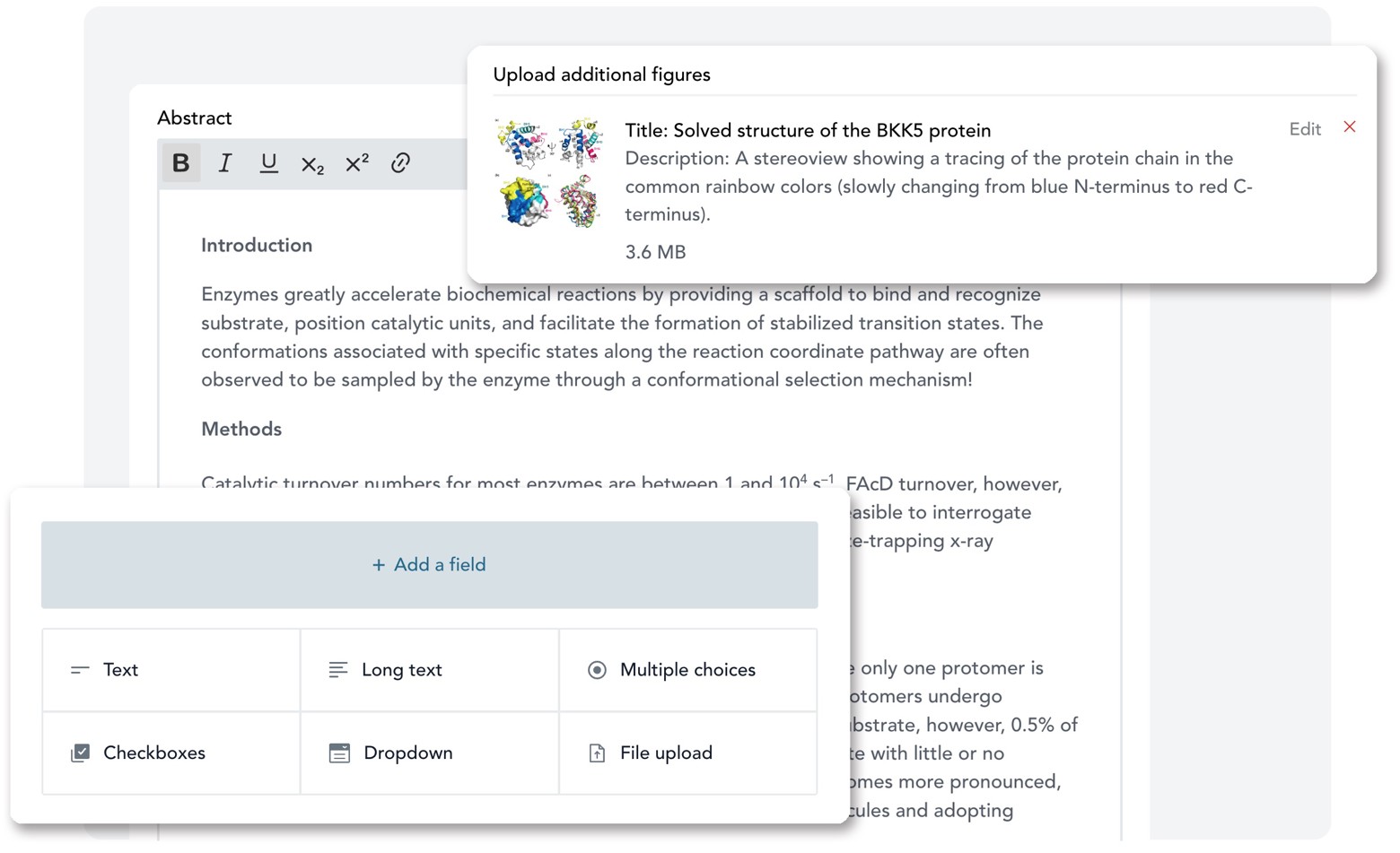
The submission forms is fully customizable on Fourwaves with an intuitive drag and drop interface.
At Fourwaves, we built an abstract management and peer-review software that is fast to set up and easy to use. As experienced academic researchers and conference organizers, our goal was to remove the complexities and simplify the abstract management and review process.
Fourwaves has an intuitive drag and drop form builder allowing you to create the perfect submission form. By default, the online form contains the standard questions like the title, the list of authors, the abstract, but you can add any other fields, for example to categorize submissions by topic, presentation type or track. This make the application process just as easy as the submission management.
Authors or submitters can login and edit their submission in real-time right until the deadline and they can upload the supplementary material like slides, posters, figures and videos.
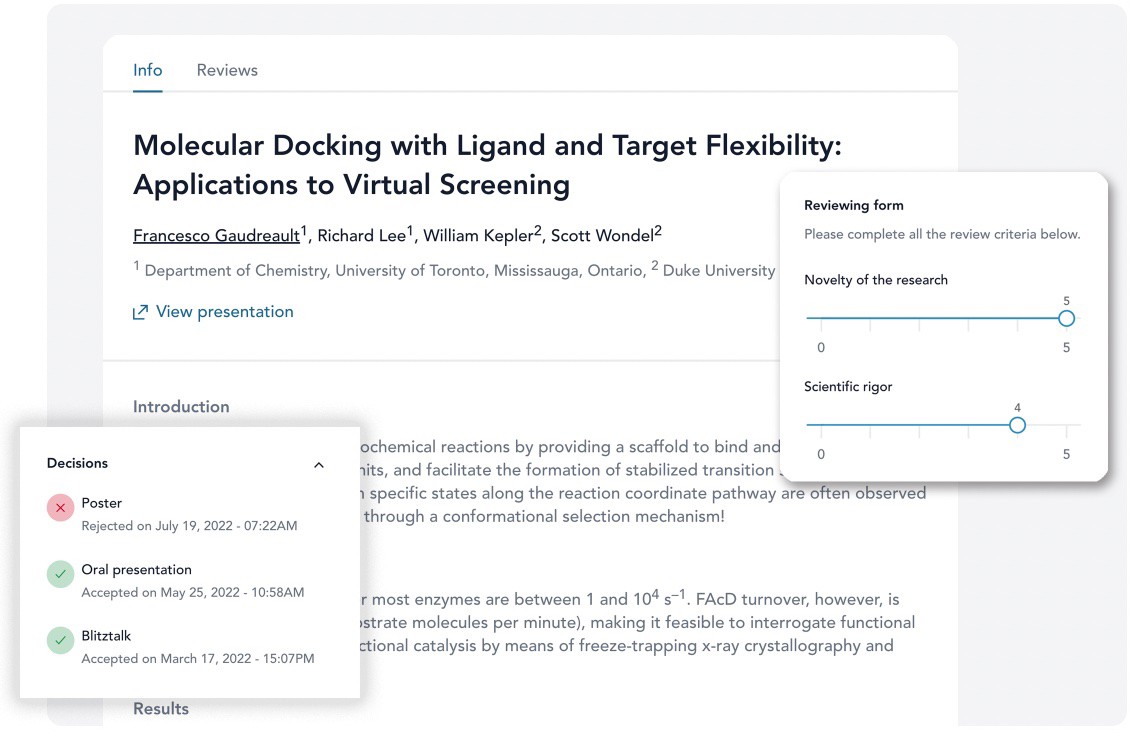
Manage your review process and find the top scored submissions on Fourwaves.
The platform also removes any friction from the peer review process by allowing organizers to choose from a single, double, or blind peer review process, then distribute submissions to reviewers either manually or randomly by choosing the desired number of reviews per submission. Session chairs have a birds eye view of all submissions under review and their status and can communicate with reviewers through the submission management platform. The submissions can be filtered by topic or final score and can be classified easily as accepted or rejected for your specific decision types. Once the reviews are complete, organizers can communicate with authors and organize the presentations in sessions to create the conference’s schedule.
Finally, the content submitted (abstracts, posters, slides, videos) can be seamlessly integrated into your event website with a search function and custom filters. Participants who access the content before or after the event can also interact with presenters either by sending a private message or by posting a question on the discussion board.
Get started today
2. Cvent
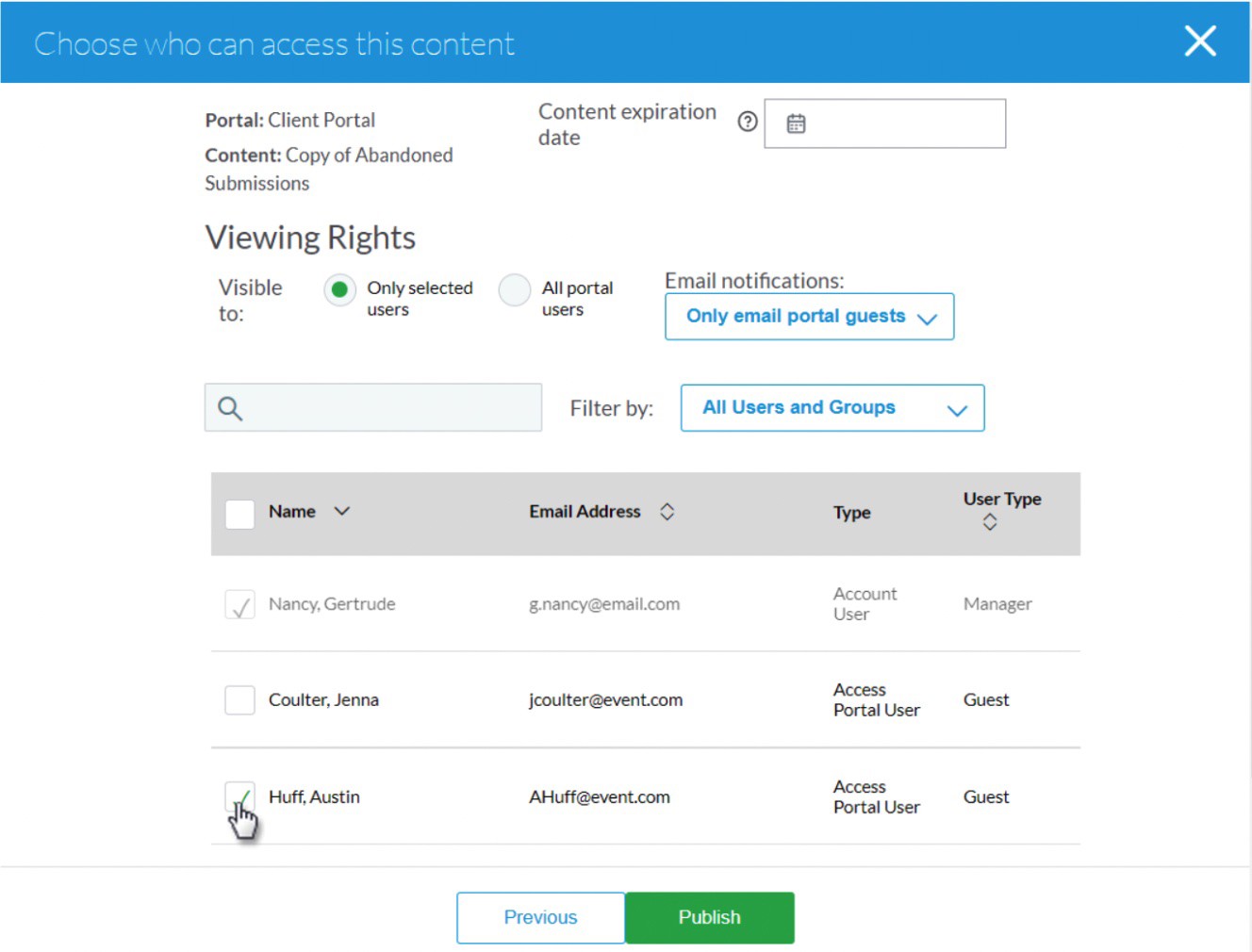
Cvent allows you to customize the submission options.
The Cvent event management software platform provides an end-to-end solution to sourcing and managing conference content that starts with the peer-review process and ends with the publishing of accepted submissions and creation of a conference agenda.
The Cvent data collection process is customizable, allowing organizers to set up their submission form to collect the specific information and file types they’re looking for. This system also provides email automation options that manage invitations, confirmations, alerts and reminders.
Cvent manages the process of reviewing the content submitted and assigning it to the reviewers responsible for that topic or track. Reviewers can access the Cvent portal for their submission management, they can rate the submissions, and the platform allows content to be sorted via scores, votes, and comments. Submissions can be approved or rejected based on these categories, and Cvent can be set up to notify authors of their application status.
Once the submission and review processes are complete, Cvent will publish this content to the event website and facilitate the creation of an event agenda.
Cvent is known to be expensive, with advertised prices that are more than three times higher than other platforms. While the platform does offer similar features to Fourwaves and it has received many excellent recommendations, some reviews published on g2.com indicate that Cvent’s user experience is not really intuitive or user-friendly. Cvent is not a tool specifically for higher education events or scientific conferences, you could use it as an awards management software, scholarship applications, grants management, or other use cases.
3. OpenWater
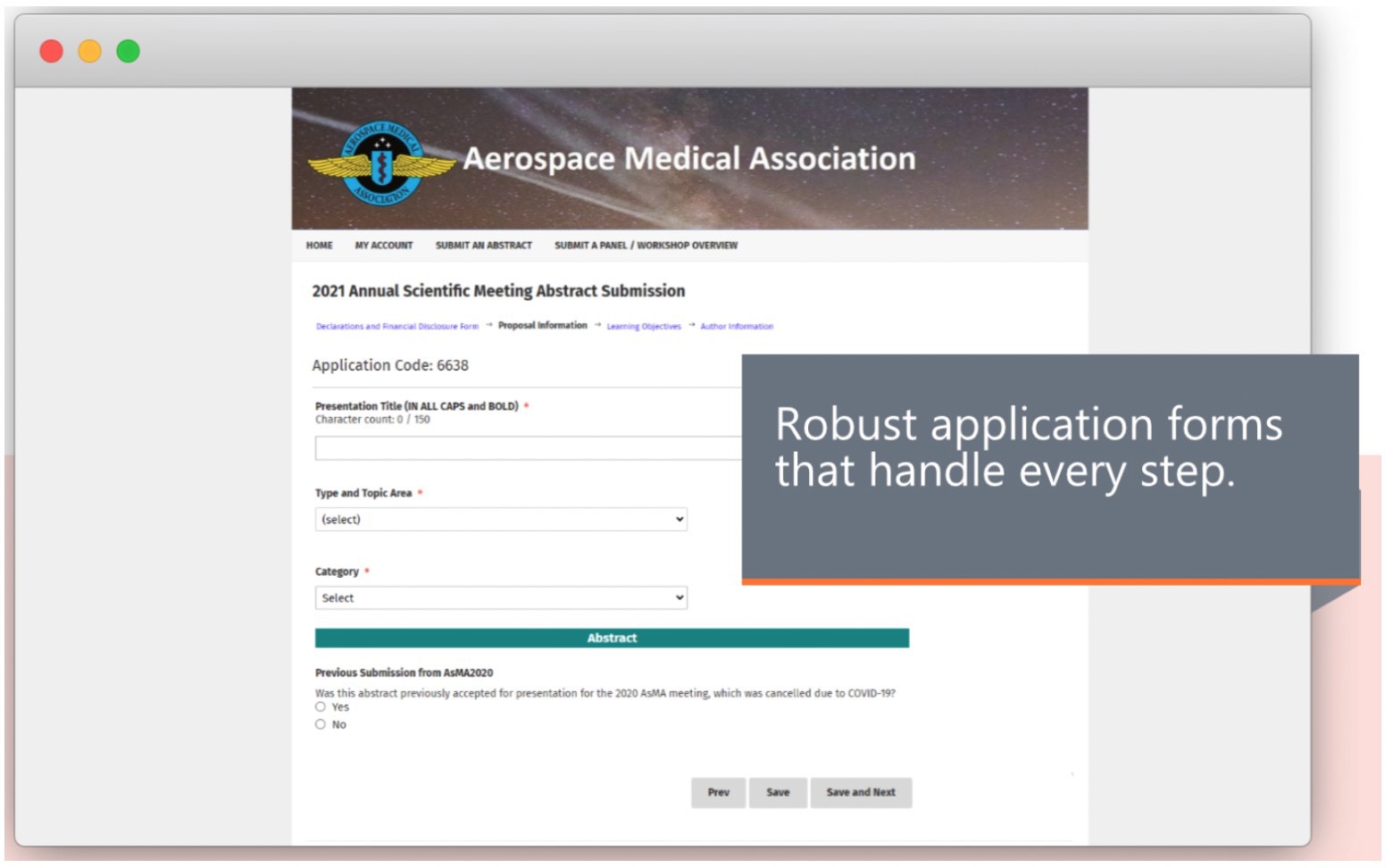
A call for proposal page on OpenWater.
OpenWater is an abstract management software system that collects abstracts, assigns them to reviewers, manages the review process, and organizes and publishes sessions.
Like the other platforms we’ve discussed, OpenWater offers a customizable submission form designed to gather all the information needed by conference organizers, with added functionality to duplicate an existing abstract collection for easy set-up the next year.
It streamlines the process of managing the peer review process and all associated communications.
It offers the ability to generate reports based on sessions, export abstract submissions, and manage event sessions in a helpful dashboard.
4. Exordo
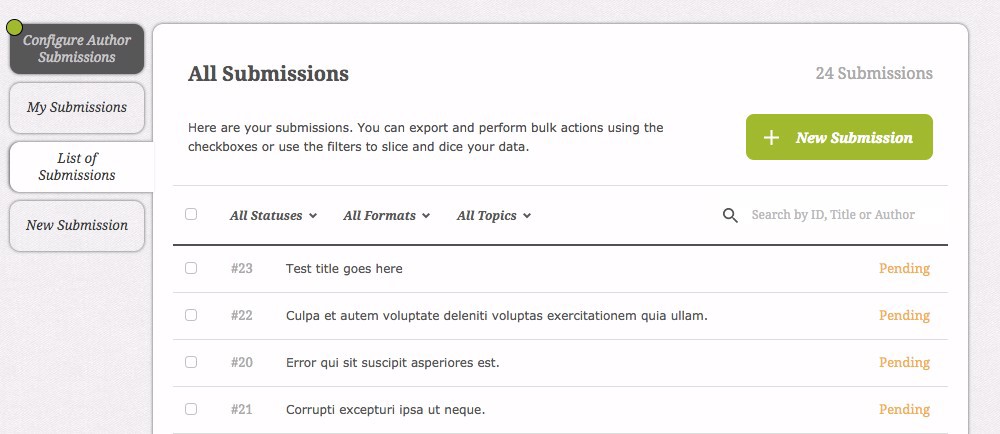
A table showing a list of submissions on Exordo.
The abstract management functions offered by Exordo simplify the process of collecting abstracts and papers, managing peer reviews, and notifying authors if their submission was accepted or rejected.
It allows conference organizers to structure the event along a single or multiple track and customize submission forms to capture the exact information needed. Next, it allows customization of the peer review process to automatically assign submissions to the reviewers responsible for that particular track or area of focus.
It tracks the review process and notifies reviewers if they are falling behind, offering the option to re-assign submissions or close or disable reviews.
When the review process is complete, event organizers can browse the completed reviews within the Exordo platform, ranking them by score when desired. The platform can also manage communications with researchers to let them know if their submission was accepted.
While the Exordo platform provides similar functionality to the other solutions listed, it does not provide a free version or trial that allows organizers to test out the platform before they commit to a paid plan.
5. EasyChair
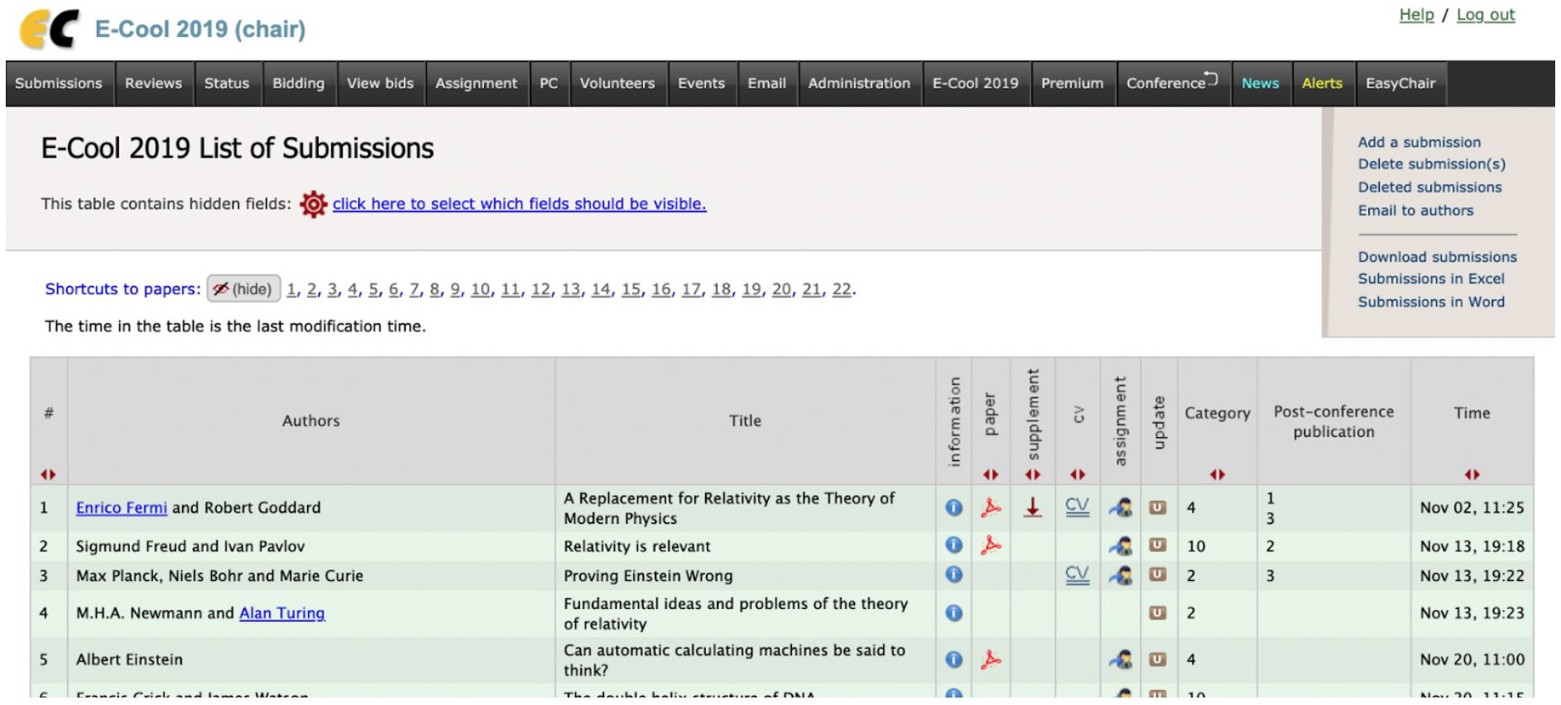
EasyChair is a submission management system that provides an interface to manage all aspects of your online submissions and review.
The EasyChair Conference Management software platform offers abstract management functions similar to the options described above.
The first main feature offered is a call for submissions, which is powered by Smart CFP. This allows for abstract, paper, and poster submissions in a variety of formats through flexible, easily-customizable submission forms.
EasyChair also manages and monitors the program committee and reviewer database management, ensuring that submissions are directed to the appropriate reviewer and any potential conflicts of interest are flagged.
Once the reviews have been submitted, the platform can facilitate online discussions about the papers, and manage the author rebuttal phase when the author can respond to the reviews and communicate with the reviewer. It also manages the process of notifying authors about the status of their submission and whether it has been accepted.
6. Dryfta
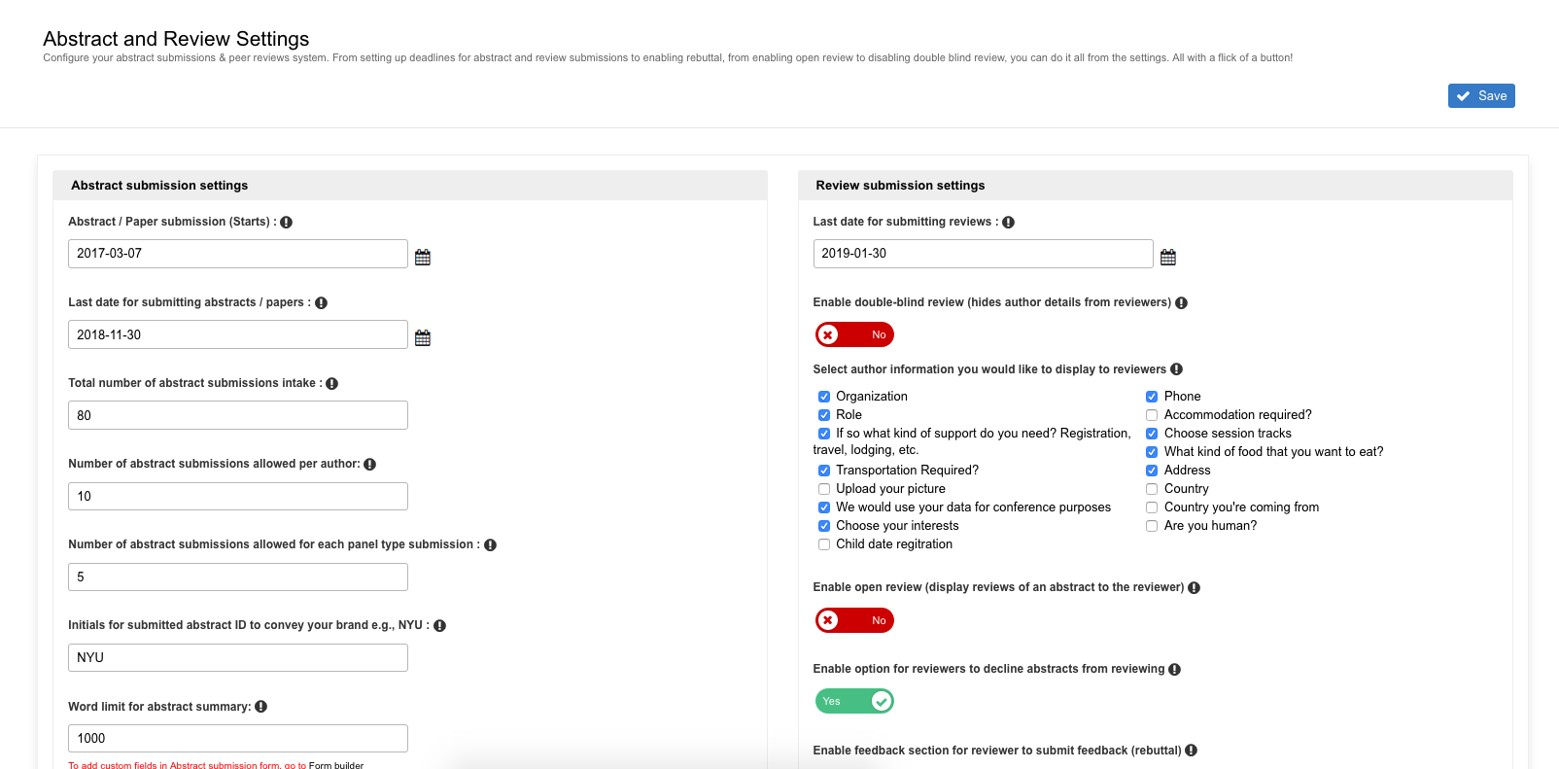
There are many submission and review options on Dryfta to adapt it to your usual workflow.
Dryfta is an event management software platform with abstract management features. It was built specifically to help organizers of university events.
Like other abstract management solutions, Dryfta manages the collection of abstracts and talks and assigns them to reviewers. It allows for automated email and test notifications on submission updates, late submissions, late reviews etc.
Organizers can select their own review process (single blind or double blind), customize their submission forms and set specific requirements and stipulations such as deadlines for abstract collection, the number of co-authors listed on a submission, and the creation of multiple submission formats with limits placed on each.
Once they’re in the system, abstracts can be filtered by custom data points and sorted by rating and status, then exported as CSV or PDF files. Both organizers and researchers making submissions can access their data in one handy dashboard.
7. Attendee Interactive (by Community Brands)
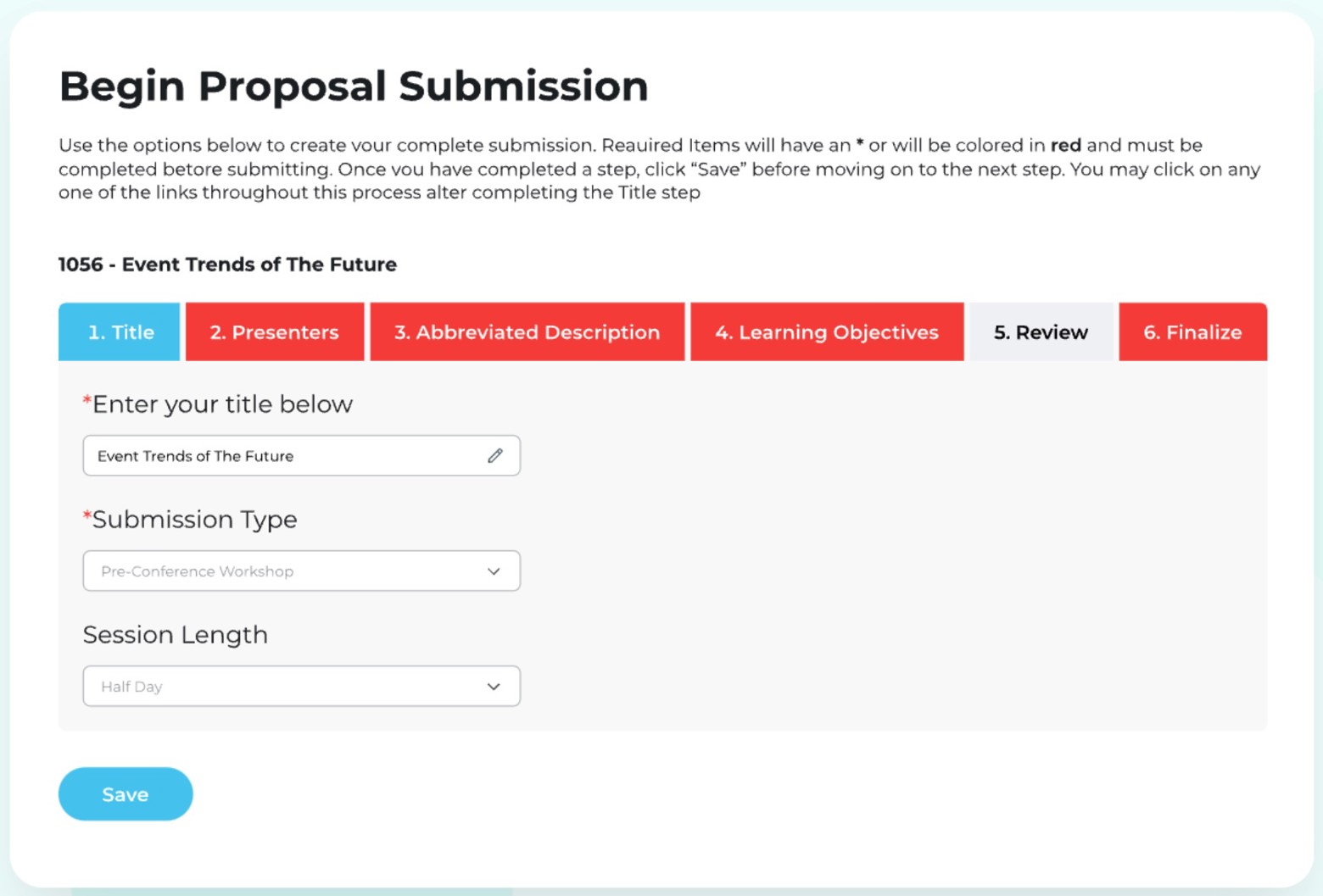
An example of a submission form on Attendee Interactive.
The abstract submission functions of Attendee Interactive allow organizers to customize their submission process to highlight the specific criteria that are most important to that event. The platform automates the process of inviting speakers to submit their abstracts and sets rules and requirements for each submission type.
The system offers review features designed to promote collaboration, assigning specific roles to reviewers based on the types of submissions assigned to them and providing reviewers with their own easily-accessible portal where they can view and manage abstracts under review. It simplifies the review process by automatically compiling reviewer comments and calculating scores, allowing reviewers to track the overall results of their grading.
Attendee Interactive also automates the process of updating and notifying applicants.
8. Oxford Abstracts
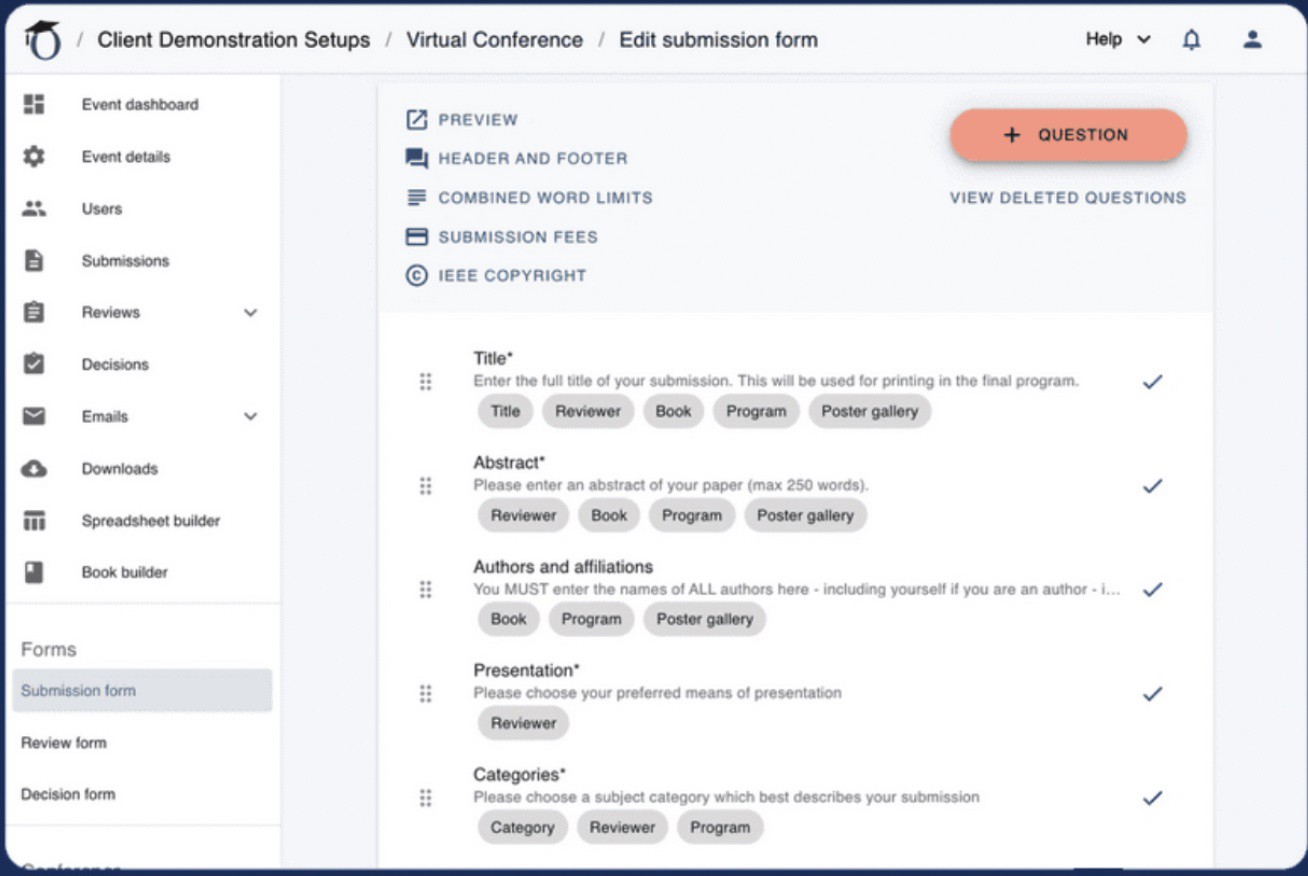
Oxford abstract allows you to customize the submission process.
Oxford Abstracts is a submission management software that helps event organizers collect submissions, review the content received, and either accept or reject its inclusion into the event.
The abstract collection process offers a customizable form with editable question templates. It also simplifies the process of publishing a call-for-papers, allowing organizers to publish the form to the event website, include it in emails, and share it on social media.
The peer review options were designed to keep things simple for reviewers. The platform automatically assigns submissions to reviewers by specialism. It provides an intuitive process for identifying any conflicts of interest, grading submissions, and making recommendations for how the submission should be presented. It also has a tracking tool that manages any late or incomplete reviews and automatically follows-up.
Oxford Abstracts provides a decision-making function that allows organizers to define their own decision process and makes it easy to access all the data needed to decide which submissions to accept or reject. Authors can be contacted from within the platform to advise them of their application status through a variety of integrated manual and custom-built emails.
This platform has received many positive online reviews. However it does not offer functionality to publish content to the event website or elsewhere. It's also not as user-friendly as other solutions on this list.
Not sure which tool to choose for your abstracts?
Conclusion
We hope this list of abstract management software options has provided you with helpful information to inform your choice. If you’re organizing an academic or scientific conference and are interested in learning more about Fourwaves, book a demo to see it in action today.


